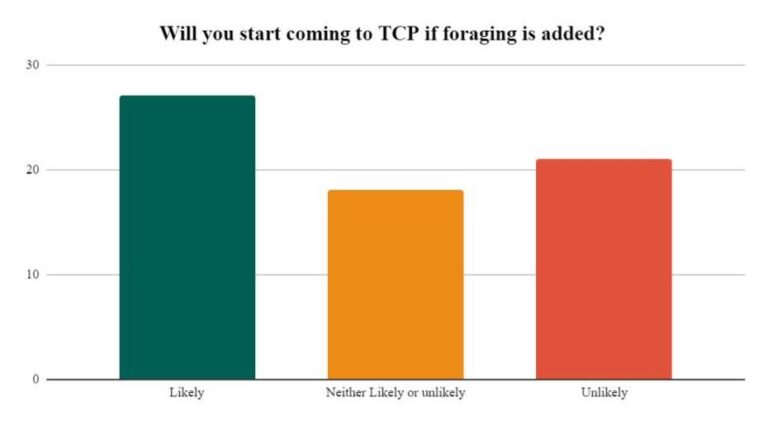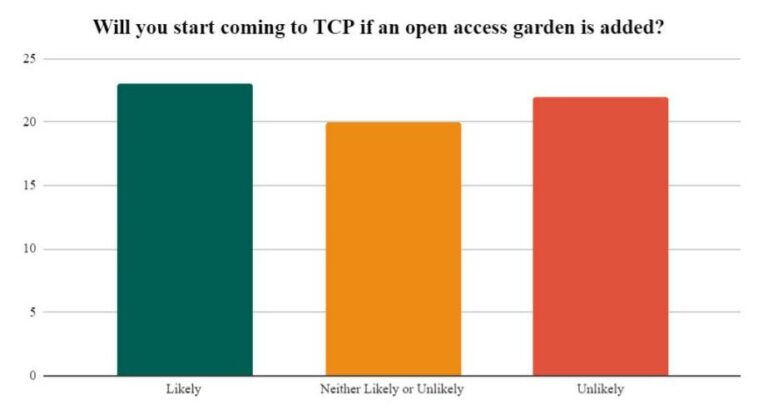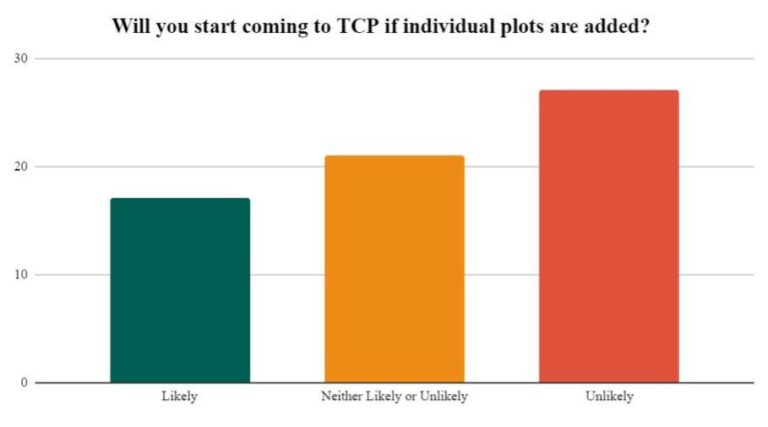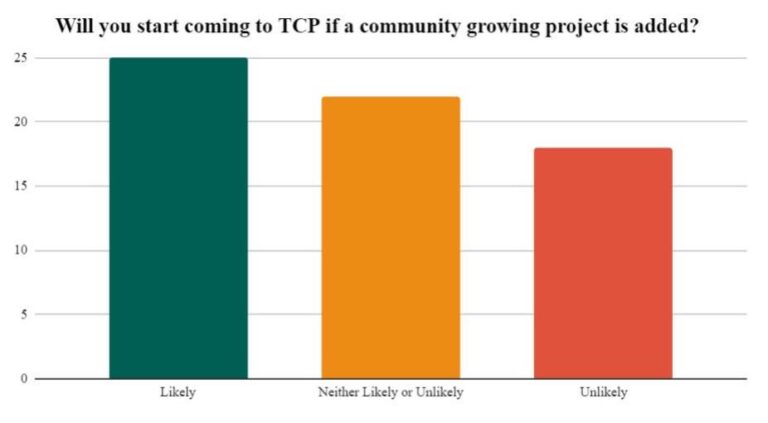This section highlights findings for one of our two research questions: How do people think about the prospect of putting FPLs in Thompson County Park? We summarize what we found about survey respondents’ and interviewees’ thoughts, feelings, and sentiments.
What do people think about setting aside space to grow and gather food in Thompson County Park?
Among 163 survey responses, the idea of adding a food productive landscape (FPL) to Thompson County Park received a lot of support. People expressed support for this in a variety of ways, including: the opportunity for an FPL to provide fresh food, community engagement opportunities, opportunities relating to gardening education, or opportunities for children’s enrichment.
At the same time, some people who expressed support also expressed hesitations. Noteworthy hesitations include concerns over the ongoing cost and maintenance associated with an FPL, or that establishing an FPL would cause drastic change in the existing natural environment in the park.
In total, there were 70 positive comments, 40 comments with hesitations, and an additional 33 that were against adding a FPL to the park.
What are the potential opportunities/drawbacks of adding the different FPLs?
From our interviews and surveys, there were a few key themes about the opportunities and drawbacks of specific FPL models.
Individual plots
- Opportunities
- Gardeners may be more accountable to their plots, improving maintenance
- Drawbacks
- Individual plots are more exclusive
- Private plots are contrary to the goals of public space
- Garden space will degrade if individuals do not maintain their plots
- Quotes
- “In the individual plots, I think that’s easier to maintain, […] because say, if I have a plot, I know I’m going to care for it. And I know what I’m going to get out of it.”
- “Individual plots are not fair to the concept of public parks. The Individuals might get upset if the public picks food from their individual plot but their plot is outside. I don’t want walls up.”
Open Access
- Opportunities
- Gives the opportunity to bond communities
- Equal access to everyone
- Drawbacks
- Garden space will need a high commitment to be well maintained
- Without rules or organization, the work and rewards may not be distributed equally
- Quotes
- “An open garden would include everyone. And there appears to be a lot of space, so one or more gardens could coexist.”
- “I like the individual plot options but it does come with some risk. The gardens could get weedy if not maintained. I suppose the open access garden would work, but like every ‘team’ project, there are always those individuals who do little or none of the work but reap all the benefits.”
Foraging
- Opportunities
- Low costs, low commitment
- Foraging is more accessible for people who cannot commit as much time and energy
- May provide a chance to highlight indigenous knowledge and perspectives
- Drawbacks
- Possible over-harvesting and/or degradation of the existing nature
- Need for education about what is edible or not in order to forage safely
- May require oversight or control
- Quotes
- “I have foraged all my life and have had an interest in edible wild plants and edible ornamental plants for over half a century. The major problem with designating a foraging area is: Will people know what’s edible? What’s poisonous? How to prepare the plants for eating?”
- “Even though I am physically handicapped, the one that is most attractive to me is the foraging area. And part of that is that a lot of the things that you find through foraging are frequently less accessible; I may not have access to other areas where I could go and forage, because I’m low income or because of other different things. And so having a place where I could go and find mushrooms, or berries or other various things of that nature just by going through the forest is more appealing to me than the idea of having to come in and periodically maintain a farm plot.”
- “I am native American Turtle Mountain Tribe. I believe foraging is the best for the land. Native Americans can guide the process and help others to learn about foraging opportunities. This will encourage people to keep all lands clean and available.”
Community Plots
- Opportunities
- Potential food justice benefits of involving a community partner who could distribute the food to those who need it most
- Educational or volunteer opportunities for the groups that choose to get involved
- Drawbacks
- Requires continuous funding and maintenance and the initial community sponsor may lose interest



